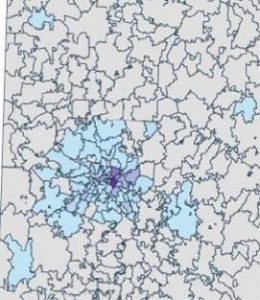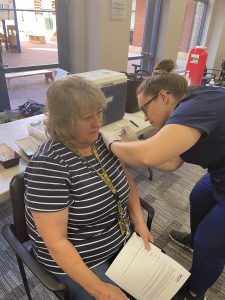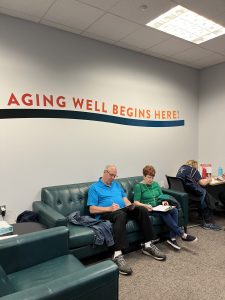Posted by
Admin on May 24, 2024

Best-in-class community centers have an innate ability to go well beyond the confines of their physical buildings to meet community need. While our JCC serves as a central hub for many vital activities and programs across the age continuum, extending our reach beyond our walls can profoundly benefit our community in numerous ways.
First and foremost, providing services outside of our physical buildings allows us to reach individuals who would not otherwise have easy access to the JCC. This could include those who live in remote areas, individuals with mobility challenges, or those with limited transportation options. By meeting people where they are, we ensure that everyone in our community has equitable access to the resources and support offered by the JCC.
We recently submitted our closeout report to the National Council on Aging (NCOA) documenting results from our local implementation of the NCOA COVID-19 and Influenza Vaccination Initiative. Through a web of community partnerships intentionally curated by our AgeWell at the JCC team, more than 1,880 vaccinations and support services were provided (377% of our contracted goal) over a 12-month period and 31 community vaccination clinics took place (288% of our contracted goal). Perhaps more impressive than the volume of work performed is the reach of the work performed. While the work itself was being managed out of our Squirrel Hill location, the heatmaps below not only illustrate that the highest concentration of clients hailed from 36 of Pittsburgh’s 90 neighborhoods, but they speak to benefit of working with embedded partners across the region and leveraging their local expertise in how best to reach their community members no matter where they are.


The Centers for Disease Control & Prevention reports that nearly nine in 10 deaths from COVID-19 are among people 65 and over and 70-85% of seasonal flu-related deaths occur in older adults. Our work across geographical, racial and ethnic boundaries with 21 trusted partners may very well have gone a long way in helping to reverse these disturbing trends within our local region.


Extending our services beyond our physical buildings also allows us to forge stronger connections with other community organizations and groups. Collaborating with local foundations, schools, senior centers, religious institutions and other community centers can foster a sense of unity and cooperation that benefits everyone involved. By working together, we can leverage our collective resources and expertise to address shared challenges and pursue common goals.
Earlier this week, my colleague Maggie Feinstein and I were invited by the Buhl Foundation to think creatively about how the JCC might support their North Side communities to be more healing-centered given the steady cadence of traumatic events they are experiencing. No one should ever have to go through the pain of a communal trauma. Yet, we cannot stop bad things from happening, and the good news is that we are all equipped to have both suffering and healing as part of the range of our lived experience. In supporting those impacted by the 2018 synagogue attack, the 10.27 Healing Partnership has developed an expertise of building resilience and fostering post-traumatic growth at the community-level, and as was the case more than 5.5 years ago when so many rushed to share with us their learnings in helping their communities heal, it is a great honor and responsibility to assist our North Side neighbors in developing a plan on their respective journey of responding to communal trauma.
In today’s fast-paced and interconnected world, it’s essential for organizations like ours to adapt and evolve to meet the changing needs of our community. How can we build on these recent examples of moving beyond our physical locations to improve public health and to address communal trauma? What program or service areas might we dive into next in bringing our skills and subject matter expertise to scale so that we can more fully embody what the JCC has been about since our humble beginnings in 1895 – improving the quality of life for individuals and community? While I don’t have the answers to these questions quite yet, I am excited by the promise they present and the opportunity for us to continue challenging the traditional approach of institutional community centers. That’s what it will take for our JCC to remain vibrant and relevant well into the future.
Wishing you and your families a Shabbat shalom,
Jason